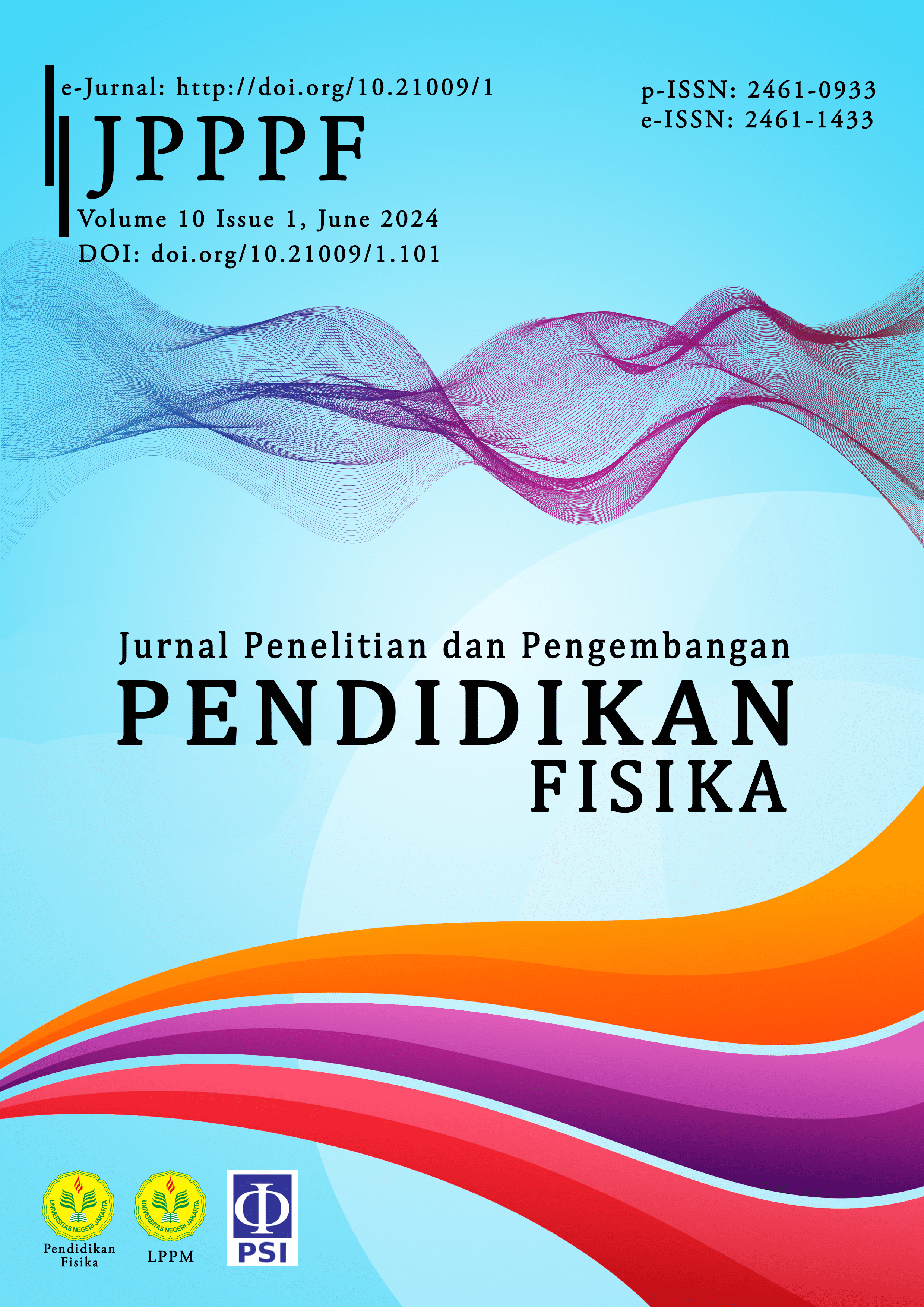Enhancing Students' Learning Outcomes and Science Process Skills through STEM Project-Based Learning on Global Warming Topics
DOI:
https://doi.org/10.21009/1.10113Keywords:
global warming, learning outcomes, project-based learning, stem, science process skillsAbstract
Global warming is a major concern, and tackling it via education is crucial. The purpose of this study is to investigate the impact of combining the Science, Technology, Engineering, and Mathematics (STEM) approach with the Project-based Learning (PjBL) model on students' learning outcomes and science process skills in global warming topics. The study, which used a one-group pretest-posttest design, collected data from 33 grade XI students via essay questions and observation sheets to assess learning outcomes and science process skills. Critical indicators of science process abilities were observing, classifying, interpreting, predicting, applying concepts, communicating, and forming conclusions. Students worked on a STEM-based project to build a flood-resistant house over the course of five meetings (including the pretest and post-test). The findings revealed considerable improvements: learning outcomes increased by 0.6 (medium category), while science process skills improved by 0.7 (high category). Observations revealed that pupils' scientific process skills were excellent. The Wilcoxon test revealed a significant difference between students' learning outcomes and science process abilities before and after the intervention, with a Sig (2-tailed) value of 0.000. The study indicated that combining the STEM method with the PjBL model improves students' learning outcomes and scientific process abilities. However, the small sample size implies that the results may not be generalizable. The consequence is that integrating the STEM method and the PjBL model provides an innovative option in physics education, improving learning outcomes and scientific process skills.
References
Fraenkel, J.R., Wallen, N.E., Hyun, H.H., 2012. How to Design and Evaluate Reasearch in Education, Eighth. ed. Connect KEarn Succeed, New York.
Hake, R.R., 1999. Analyzing Change/Gain Scores. https://doi.org/10.24036/ekj.v1.i1.a10
Huriah, et al. (2018). Pengaruh Penerapan Project Based Learning (Pjbl) Terhadap Peningkatan Kemampuan Kognitif, Afektif Dan Psikomotor Mahasiswa. Jurnal Kesehatan “Samodra Ilmu, 9(1).
Jatmiko, M.A., Hatibe, A., Darsikin, 2021. Effect of Science Process Skills with Project Based Learning Model on Physics Learning. Media Eksakta 17, 24–27.
Oyewo, O.A., Ramaila, S., Mavuru, L., 2022. Harnessing Project-Based Learning to Enhance STEM Students’ Critical Thinking Skills Using Water Treatment Activity. Educ. Sci. 12, 780. https://doi.org/10.3390/educsci12110780
Pradita, A.P., Budiharti, R., Budiawanti, S., 2020. Analisis Kebutuhan Pengembangan Perangkat Pembelajaran Fisika Berbasis Proyek Materi Gejala Pemanasan Global. J. Mater. dan Pembelajaran Fis. 10, 20. https://doi.org/10.20961/jmpf.v10i1.41583
Purnomo, Halim dan Ilyas, Y. (2019). Pembelajaran project based learning. Yogyakarta : K- media
Purwaningsih, E., Sari, S.P., Sari, A.M., Suryadi, A., 2020. The effect of stem-pjbl and discovery learning on improving students’ problem-solving skills of the impulse and momentum topic. J. Pendidik. IPA Indones. 9, 465–476. https://doi.org/10.15294/jpii.v9i4.26432
Radhiyah, R.W., Hariyono, E., 2022. Pemanfaatan Terrarium Sederhana dengan Model Problem Based Learning untuk Melatihkan Keterampilan Berpikir Kritis Siswa pada Materi Perubahan Iklim. Briliant J. Ris. dan Konseptual 7, 299. https://doi.org/10.28926/briliant.v7i2.959
Sukmawijaya, Y., Suhendar, Juhanda, A., 2019. Pengaruh Model Pembelajaran Stem-Pjbl Terhadap Kemampuan Berpikir Kreatif Siswa Pada Materi Pencemaran Lingkungan. BioEdUIN 9, 28–43.
Sulaeman, N.F., Efwinda, S., Putra, P.D.A., 2022. Teacher Readiness in STEM Education: Voices of Indonesian Physics Teachers. J. Technol. Sci. Educ. 12, 68–82. https://doi.org/10.3926/jotse.1191
Triana, N. (2021) LKPD Berbasis Eksperimen Tingkatan Hasil Belajar Siswa. Jawa Barat; Guepedia
Umam, H.I., Jiddiyyah, S.H., 2020. Pengaruh Pembelajaran Berbasis Proyek Terhadap Keterampilan Berpikir Kreatif Ilmiah Sebagai Salah Satu Keterampilan Abad 21. J. Basicedu 5, 350–356. https://doi.org/10.31004/basicedu.v5i1.645
Widarti, H.R., Rokhim, D.A., Syafruddin, A.B., 2020. The development of electrolysis cell teaching material based on stem-pjbl approach assisted by learning video: A need analysis. J. Pendidik. IPA Indones. 9, 309–318. https://doi.org/10.15294/jpii.v9i3.25199
Wijayanto, T., Supriadi, B., Nuraini, L., 2020. Pengaruh Model Pembelajaran Project Based Learning Dengan Pendekatan Stem Terhadap Hasil Belajar Siswa Sma. J. Pembelajaran Fis. 9, 113. https://doi.org/10.19184/jpf.v9i3.18561
Yunita, D., Nurhadi, M., Kusumawardani, R., 2018. Analisis keterampilan proses sains dan hasil belajar siswa kelas X dengan menggunakan model pembelajaran PBL (problem based learning) pada pokok bahasan larutan elektrolit dan nonelektrolit. Bivalen Chem. Stud. J. 1, 96–100. https://doi.org/10.30872/bcsj.v1i2.290











